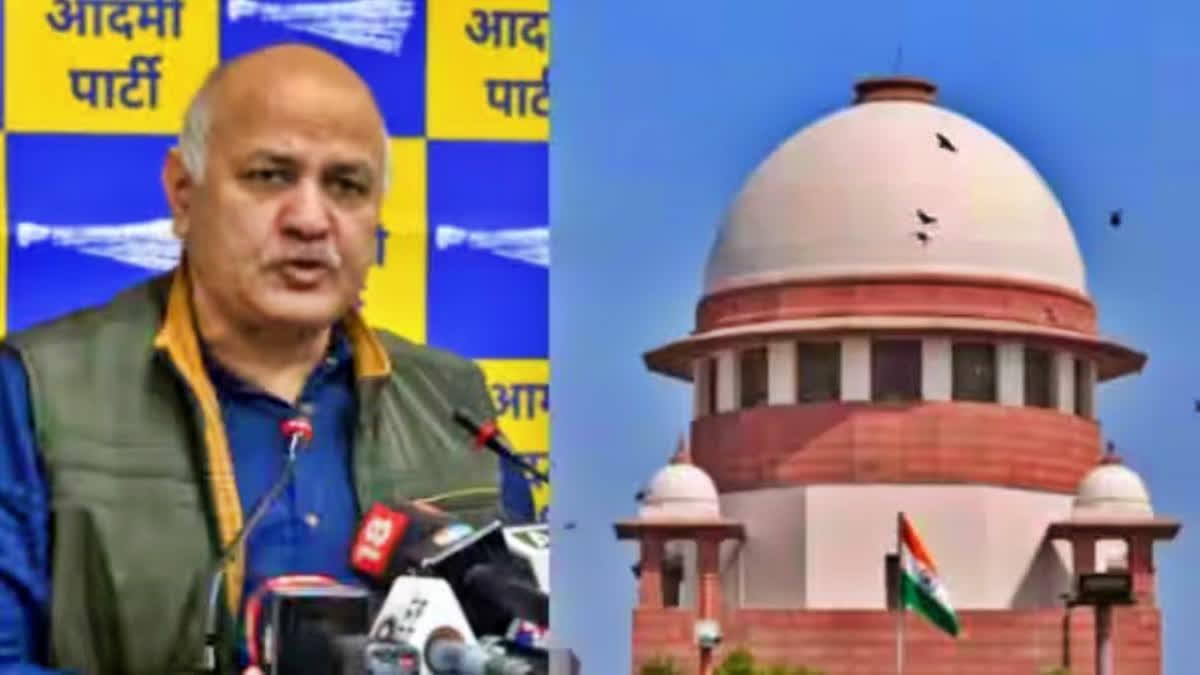New Delhi: The Supreme Court Thursday clarified that a question on Wednesday put to the Enforcement Directorate (ED), about making the AAP an 'accused' in the Delhi liquor policy case, was "not to implicate any political party", rather it was just a legal question.
Senior advocate A M Singhvi, representing Manish Sisodia, submitted before a bench comprising Justices Sanjiv Khanna and SVN Bhatti that the question why the party was not made an accused was portrayed by news outlets, as the court wants Aam Aadmi Party (AAP) to be made an accused. “This is the headline, court asks ED why AAP is not an accused and today in the morning all the channels are carrying that ED has indicated that it wants to make AAP an accused”, Singhvi submitted.
Justice Khanna said there are two things Mr. Singhvi, one in the court “we ask questions, we want answers because when he showed us the chart there was a name…..number two, we don’t get influenced by the media”. Singhvi said it is in the news that they are making AAP an accused based apparently on the court’s comment. Justice Khanna said, “It is not my comment, it is a question which I asked”.
The bench said, “Making it very clear in the course of arguments you showed us a chart, we did not conclude anything. We just said this is your contention….”.
Additional Solicitor General SV Raju, representing the ED and Central Bureau of Investigation (CBI), said, “I was today asked by the media in the morning. I said that if there is evidence, we will not spare anybody, and if there is no evidence, we will not harass anybody, that is the statement which I made”.
Singhvi cited newspaper stories saying the court asks why AAP was not made an accused and stressed that the court put up a query but there was an utter distortion of that query. Singhvi said today the person who has good roots in society, no flight risk - he has been in jail for eight months and there are clear loopholes, and he has a good chance of acquittal. Singhvi concluded his arguments.
The bench said before Mr Raju proceeds, it wants to clarify that its question yesterday was not to implicate anyone. The bench said suppose as per the prosecution if A is not being prosecuted can B or C be prosecuted? In that context, the question was posed as a legal question.
Justice Khanna asked Raju the allegation that the excise policy was manipulated for monopolisation and cartelization, and the wholesale trade you're referring to, not retail sale?
Raju submitted that they are not challenging the policy decision. Justice Khanna said but the agency says that policy decision was motivated for personal benefits, so will it not mean that you're challenging the policy decision? Raju said the policy was framed in a manner to benefit the wholesalers, and I will show how it was framed and what was the role of Sisodia.
Raju said they had a particular policy in mind and they created a facade to make it what they wanted, and they did not want the old policy. Raju said to change the policy they got the Dhawan committee report but it wasn't what they wanted, so they invited objections and suggestions. In those objections we see the role of the petitioner, he added.
Raju said they said that everyone who gives Rs five crores will be eligible, and in that manner, they could pick and choose who they wanted, and they wanted particular persons to be the wholesalers so they modified the policy.
The hearing on the matter will continue in the afternoon session. On Wednesday, the Supreme Court queried the ED, why the political party, which is alleged to be a beneficiary, is not made an accused in the case under the Prevention of Money Laundering Act (PMLA) while hearing bail pleas of AAP leader and former Delhi deputy chief minister Manish Sisodia, who is facing charges of money laundering and corruption for alleged irregularities in the framing and implementation of a now-scrapped Delhi liquor policy.
The apex court asked Raju if according to you a party (AAP) is the beneficiary of the scam, why was the party not made an accused? The court further queried, how far can Cabinet notes be triable, and scrutinized by the court. The apex court asked Raju to answer it on Thursday. The apex court was hearing two petitions filed by Sisodia challenging the decisions of the Delhi High Court, denying him bail in the cases being investigated by the CBI and the ED.
Also read: SC dismisses sacked IPS officer Sanjiv Bhatt's pleas, slaps Rs 3 lakh fine



